As the land of "The First Famous Tea" of Vietnam, for many years, Thai Nguyen province has identified tea as its main crop. 70% of the people in Thai Nguyen have economic resources related to tea trees.
[embed]https://www.youtube.com/watch?v=NsAxwEU4Jjk[/embed]
According to data from the Department of Agriculture and Rural Development, the whole province currently has nearly 22,500 hectares of tea, with fresh tea bud output reaching over 267,500 tons, and the average value of tea products reaching about 12,300 billion VND/year.
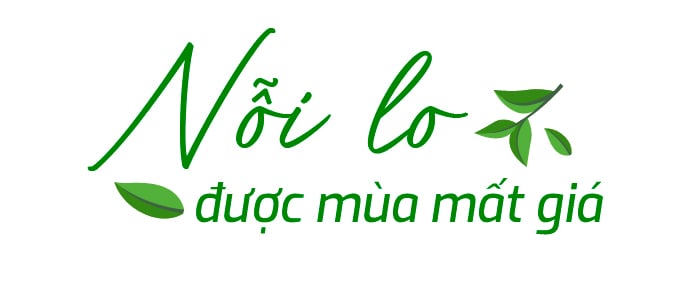
The early autumn days, when the weather still retains the heat of summer, but gradually shows signs of coolness in the early morning, are the times when tea trees gather the essence of heaven and earth to produce tea leaves with a rich, aromatic flavor, suitable for the taste of Vietnamese people.
Tea connoisseurs will have to choose the early morning, when the sun has not yet risen, the cool morning dew drops are still on each tea leaf to start picking the tea buds - the fresh buds that the tea tree has spent a whole month nurturing with the essence of heaven and earth to produce.

People in Ao Rom 1 hamlet, Khe Mo commune, Dong Hy district, Thai Nguyen pick tea in the early morning to provide raw materials for Tan Hiep Phat to produce Khong Do Green Tea.
"The tea picking process must be completed before 7am. After 7am, when the sun comes up, the tea will not be as good as when it is covered with dew," Ms. Nguyen Thi Nga (Non Beo village, La Bang commune, Dai Tu, Thai Nguyen) began her story about picking tea like that.
Normally, tea picking should be avoided during strong sunlight. In the morning, tea should only be picked until 10am and in the afternoon, tea picking should begin after 2pm.
Freshly picked tea will be dried on a sieve to remove excess water, making it easier to process further.
After drying, the tea leaves will be kneaded and sieved to remove yeast to further shape the flavor and create the color of the tea.
Then, the raw materials will be put into the shaping machine to create fragrant teas such as nail tea, hook tea, curly tea, and then put into the dryer to produce the finished products of Thai Nguyen specialty teas.
Normally, the average price of hook tea is 250,000-500,000 VND/kg, shrimp tea is 600,000-750,000 VND/kg, and dinh tea is from 1.5 million VND to over 5 million VND/kg...
In stable years, tea trees will bring effective economic benefits to tea growers, ensuring income for each household from 10 - 15 million VND/person/month, tea businesses will also earn several billion...
This year, the tea harvest from May to early August has resulted in high yields, but instead of being happy about the bumper crop, Thai Nguyen people are worried because the price of fresh tea is falling.

Green tea leaves are woven with yeast after picking to ensure the best quality of the finished tea product.
At Phuc Xuan market (held on the 1st, 4th, 6th, and 9th of the lunar month) and Phuc Triu market (held on the 2nd, 5th, 7th, and 10th of the lunar month) - the two largest tea markets in Thai Nguyen, traders here are "disappointed" because tea prices are lower than every year.

"Fresh tea has dropped from 35,000-40,000 VND/kg to 15,000-20,000 VND/kg, some types of dried tea have even dropped from 400,000 VND/kg to 85,000 VND/kg but there are still no buyers," said a trader.
The drop in wholesale tea prices has also affected the lives of tea growers. Ms. Bui Thi Thao (Khe Mo commune, Dong Hy district) said that taking care of tea trees requires a lot of time, effort and investment. It takes up to 3 years of care before they start to generate income.
If the tea garden is old, it can make up for the price this year, this month, that month, but if the price drops for a long time, people will suffer heavy losses, even having to cut down the tea trees that are just starting to grow strong to switch to other types of trees.
The unstable price of tea is making many tea growers in Thai Nguyen think about historical images from 10 years ago: tea trees, even ancient tea trees, were cut down to convert to growing acacia for a more stable income...

While tea prices in the market are unstable as at present, traders are "disappointed" because of the decrease in tea leaves, at Thu Hien Tea Cooperative (Ao Rom 1 hamlet, Khe Mo commune, Dong Hy district) they are increasing production to meet orders from businesses.
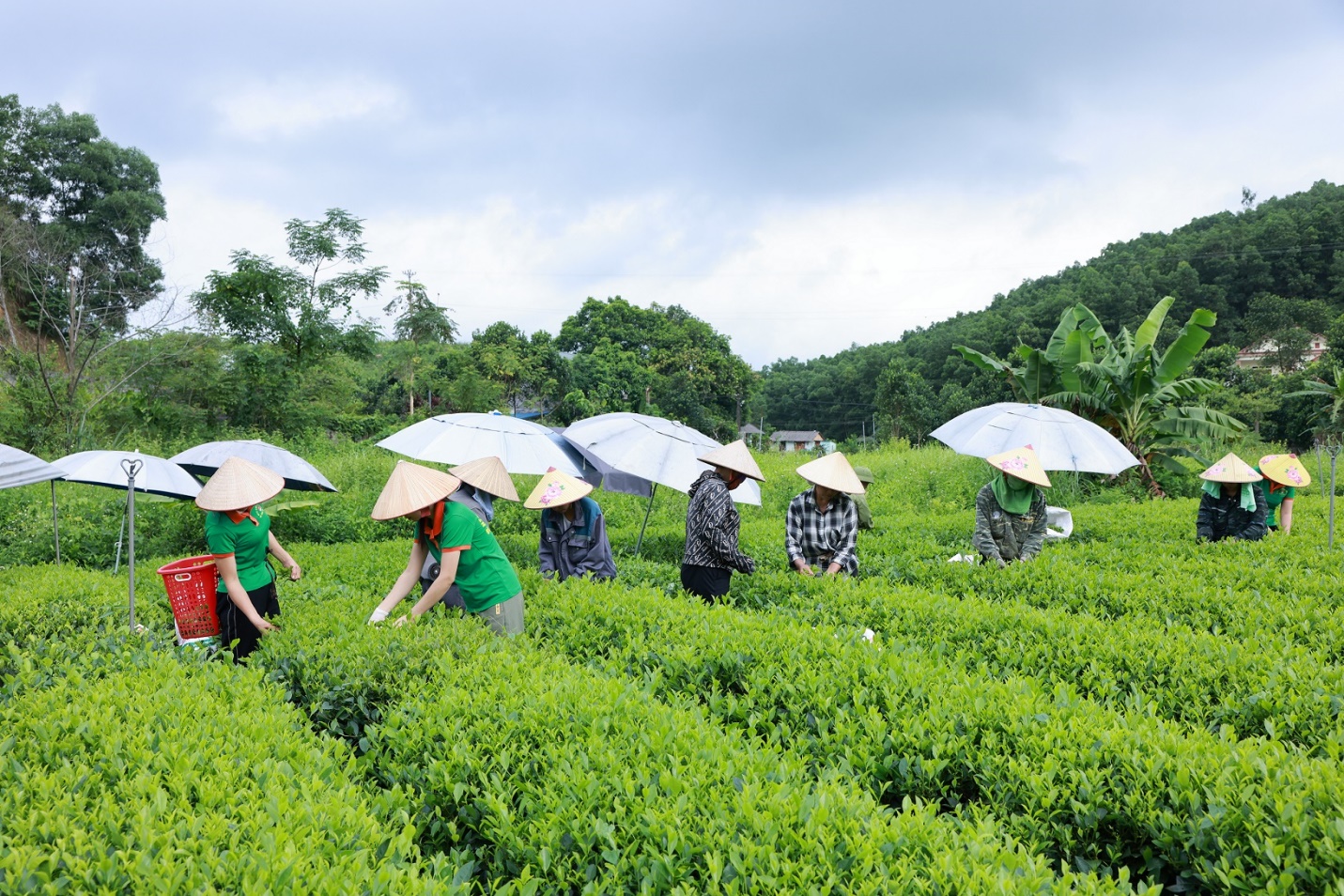
People in Thu Hien Tea Cooperative pick tea leaves as raw materials to produce Zero Degree Green Tea.
The thing is, Thu Hien Tea Cooperative has a supply contract with Thai An Tea Company Limited (Thai Nguyen) to supply dry tea. On average, Thai An Tea Company will consume about 1,500 - 1,700 tons of dry tea per year. This year, Thai An Tea Company has just signed a cooperation contract with Tan Hiep Phat Company, so the monthly dry tea output has increased from 120 - 150 tons.
"Currently, in addition to the tea output of the cooperative members, we also have to cooperate with about 100 local tea-growing households to ensure the output supplied to Thai An Tea Company for transfer to Tan Hiep Phat," said Ms. Nguyen Thi Thu Hien, Head of Thu Hien Tea Cooperative.
This is a typical example of a chain-linked tea growing model - a model that is considered to solve the problem of good harvest and low prices.
Specifically, in the chain linkage, enterprises with output will place orders with suppliers. These companies will coordinate with cooperatives, cooperative groups and people to grow the types of tea that the enterprises require. The advantage of this option is that the output of the product is guaranteed to be consumed even before planting begins.
Similar to Thu Hien Tea Cooperative, Minh Phuong Tea Company Limited (Co Lung Commune, Phu Luong District) is also busy collecting and packaging semi-finished dry tea products to transfer to Tan Hiep Phat.
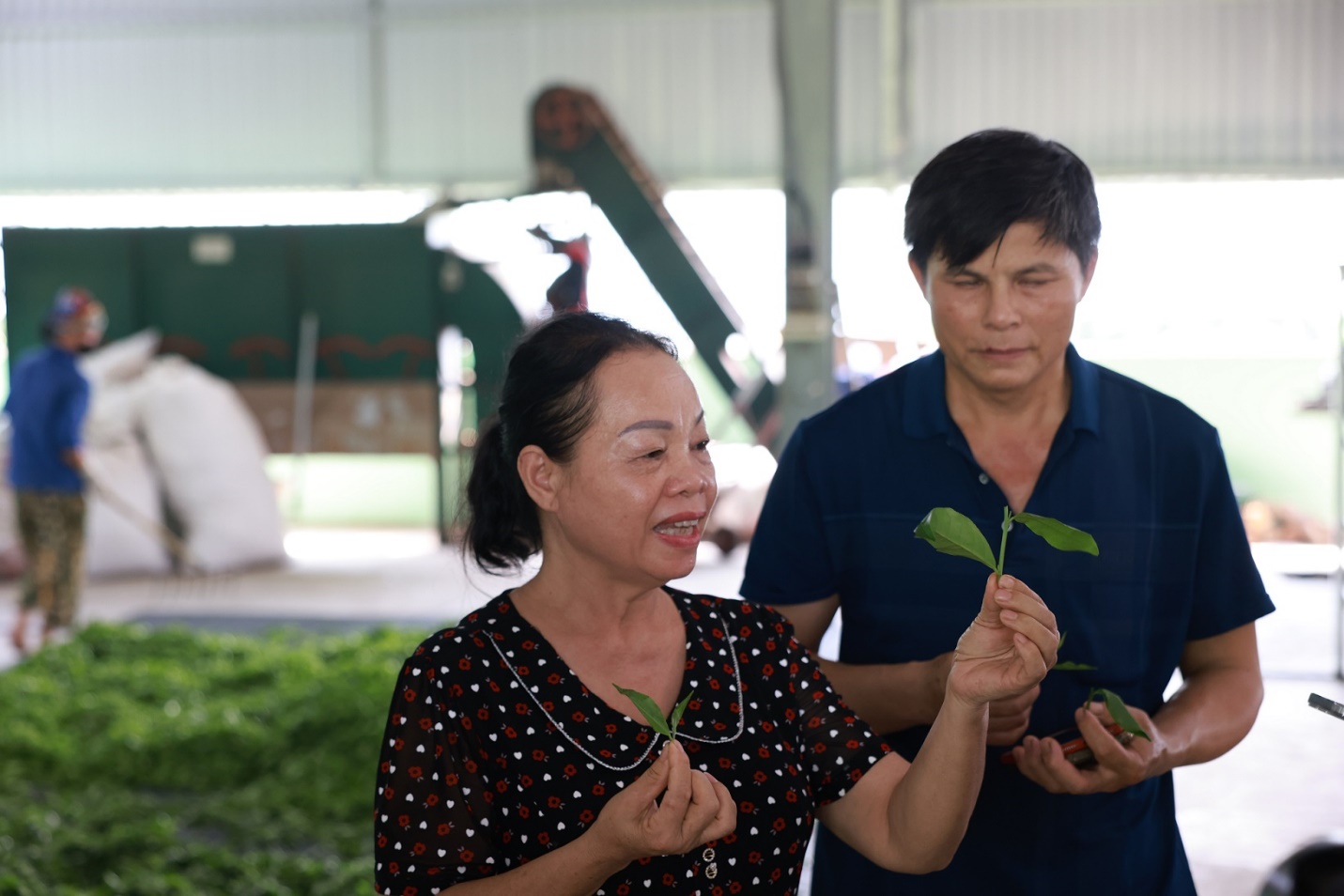
Ms. Nguyen Thi Hien, Director of Minh Phuong Tea Company Limited, introduces how to identify the quality of green tea leaves and raw materials supplied to Tan Hiep Phat.
Ms. Nguyen Thi Hien, Director of Minh Phuong Tea Company Limited, said that Tan Hiep Phat is a large domestic enterprise, producing Khong Do Green Tea from green tea leaves to serve domestic and foreign consumers, so their demand for tea is very high. When signing a contract to supply products with Tan Hiep Phat, Minh Phuong Tea Company's output will almost double.
Similarly, Ms. Ngo Le Huyen, Deputy Director of Thai An Company Limited, said that the company is currently exporting tea to other countries, but signing a contract with Tan Hiep Phat helps the company's output double.
Ms. Huyen added that tea supplied to Tan Hiep Phat must meet a series of requirements regarding quality indicators. However, with investment in infrastructure and increased updating of knowledge, processes for planting and caring for tea trees from the beginning, Thai An Tea Company ensures that it meets more than 30 criteria according to the strict standards set by Tan Hiep Phat.
Speaking more about the signing with Tan Hiep Phat, Ms. Huyen said that in addition to helping the company increase production and revenue, it also helps people have more jobs and stabilize their lives.
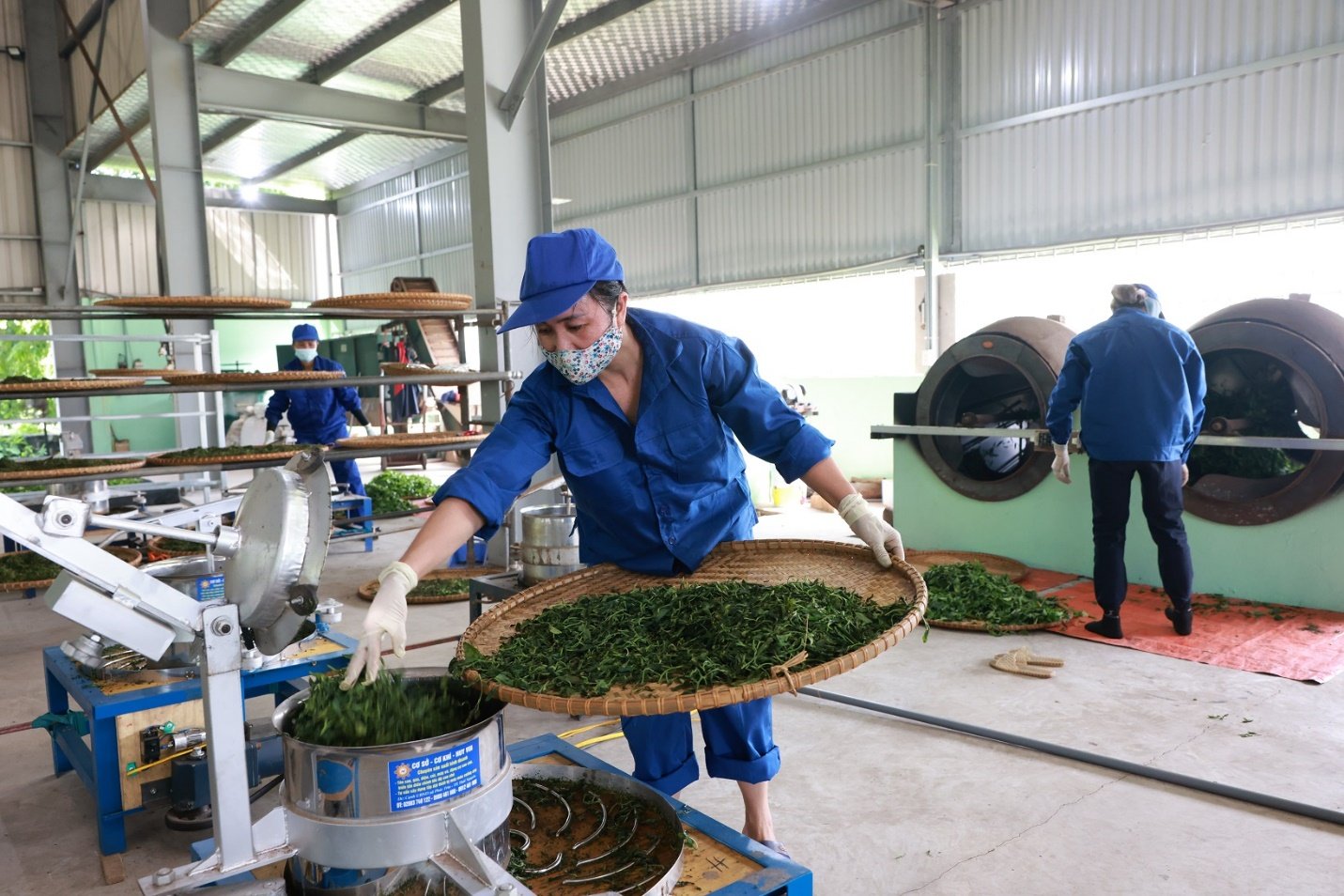
Minh Phuong Tea Company has about 70 employees with an average income of 10 - 12 million VND/month.
Ms. Huyen explained that normally, before signing the contract with Tan Hiep Phat, people only produced good tea for sale, so each year the crop lasted about 8 months, and during the winter the tea plants had to rest, so people had to apply for seasonal jobs.
But if they make tea for Tan Hiep Phat, people can take advantage of the winter months to pick tea, so they don't have to work as seasonal workers anymore, solving the labor problem for the locality.
With output guaranteed by a large enterprise like Tan Hiep Phat and a clear price contract, people do not have to bear the risk of "good harvest, low price", and people's lives with tea plants will be more secure.
People with jobs also help reduce social evils and maintain security and order.
"When combining with Tan Hiep Phat, besides profit, the greatest value created is creating stable jobs for farmers, helping farmers feel secure and more attached to tea plants," said Ms. Huyen.
Source: https://www.baogiaothong.vn/de-doi-che-thai-nguyen-them-xanh-va-gia-tang-gia-tri-192240829183108235.htm










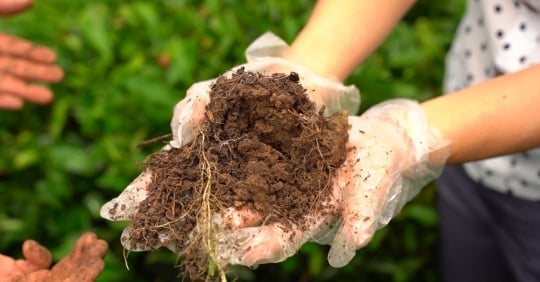































![[Photo] Prime Minister Pham Minh Chinh chairs Government Conference with localities on economic growth](https://vstatic.vietnam.vn/vietnam/resource/IMAGE/2025/2/21/f34583484f2643a2a2b72168a0d64baa)
























































Comment (0)